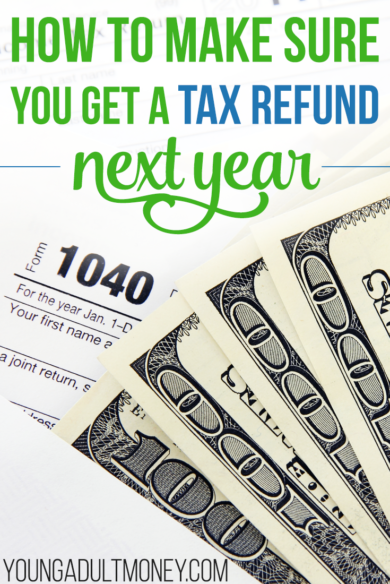 How to Make Sure You Get a Tax Refund Next Year
How to Make Sure You Get a Tax Refund Next Year
Many people go into tax season having on idea whether they will end up owing taxes or will be getting a refund.
And while many finance experts may say that it’s best to not receive a refund, many feel better when they do receive an income.
My wife and I have taken the approach of erring on the side of receiving a refund versus owing money come tax time. Why? Because we had an $8,000 tax bill before and it wasn’t fun (there may have been tears). It truly was the perfect storm of not having enough money withheld and not calculating quarterly estimated tax payments appropriately for my side hustles.
Not surprisingly I’ve spent a decent amount of time since then reading up on taxes. And today I want to give you tips on how to make sure you receive a tax refund next year.
Claim Zero Allowances on your W-4
The allowances section on a W-4 is a mystery to most people. You likely have heard the general advice “claim 0 or 1,” but what does that mean?
In short, claiming zero causes your employer to withhold more from your paycheck; claiming one causes them to withhold less. It’s generally recommended that if you are single with no dependents you should claim zero. If you file jointly with a partner and have no dependents or if you are single with one dependent it’s generally recommended you claim one allowance. Depending on the size of your family it may make sense to claim two, three, four, etc. allowances.
If your primary goal is to receive a tax refund, though, claiming zero is the way to go regardless of your filing situation or number of dependents. Why? Because it causes your employer to withhold the most amount of money.
Again, there are many personal finance experts who say you should shoot for having no refund and owe as little as possible to the government, and it does make logical sense. But if your goal is to get a tax refund, claiming zero is the best move.
Have Additional Dollars Voluntarily Withheld Each Paycheck
Did you know that you can voluntarily have extra money withheld each paycheck for federal and/or state taxes? Most people don’t because they haven’t had a reason to.
Let’s say you have three part-time jobs. Even if you claim zero allowances, each employer is going to withhold taxes as if this was your only source of income. Meaning, even if you build up a sizable taxable income, you may have had very little withheld from any of the three employers and you could very well be stuck with a big tax bill.
In this scenario and various other scenarios it doesn’t make sense to rely on your employer to withhold the proper amount of money from your taxes. You will want to voluntarily have money withheld each paycheck.
This also makes sense if you have side income but aren’t paying quarterly estimated taxes, which we will review next.
Make Quarterly Estimated Tax Payments for Side Income
If you have income outside of your 9-5 job such as dog walking, blogging, or freelance writing, you should make quarterly estimated tax payments.
If you haven’t made quarterly estimated tax payments in the past you are probably wondering what the heck they are. Don’t worry, most are not familiar with them until they need to be (usually after owing a relatively large amount of money to the IRS after filing their taxes.
Because business, self-employed, and side hustle income doesn’t come through an employment relationship, there is no employer withholding tax dollars like there is for a 9-5 job. That means it falls on you to make the appropriate estimated tax payments to the IRS each quarter.
A few years back when my wife and I got hit with a big tax bill I made it a point to understand quarterly tax payments inside and out. I share about quarterly tax payments as well as a calculator in this post. I recommend you check it out if you have a side hustle or side income.
None of these strategies can guarantee you will get a refund, but they will make it much more likely. If you are really paranoid about taxes it makes sense to spend some additional time looking into things like tax-advantaged accounts and regularly reviewing how much has been withheld for taxes and paid in quarterly estimated taxes relative to the income you’ve made.
Related:
Do you like getting a tax refund? Have you ever owed a lot to the government at tax time?


After a few years of not having a tax refund, I need to get one next year. I’m tired of owing the government money.